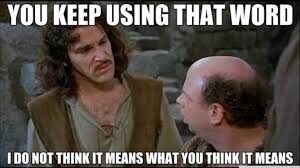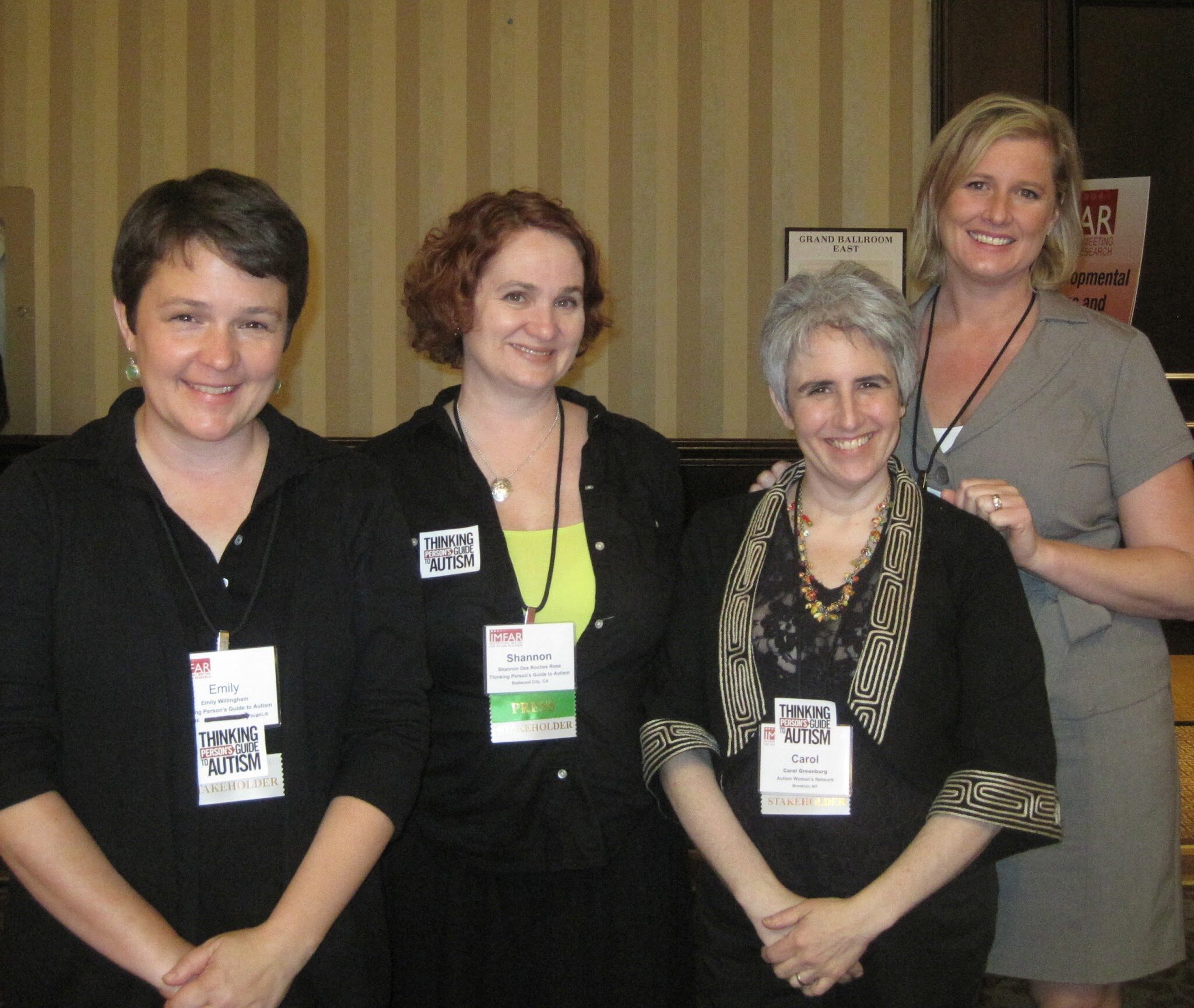Since I didn’t know I was autistic, I just assumed there was something wrong with me and that I deserved what I got. I learned that intrinsically, I was less than a person, since I didn’t have a framework to tell me otherwise.
Tag: self-advocacy
Maxfield Sparrow unstrangemind.com [image: Screenshot of Inigo Montoya and Vizzini from the movie The Princess Bride, with white overlaid block text reading, “You keep using that word. I do not think it means what you think it means.] Last week, the San Francisco Autism Society of America (SFASA) held its 16th annual conference at Stanford University. In her opening comments, Jill Escher, the president of SFASA, went through a few words and phrases, claiming to “defuse some autism vocabulary stinkbombs.” I disagree with so much of what she said about … well, about pretty much everything she talked about. But I want to focus in on one word that I feel she completely misrepresented on so many levels that it was mind-boggling: Self-advocate Escher chose to show a 20 second video clip of her son to the audience, to illustrate her lack of understanding of the meaning and expression of…
Holly Robinson Peete | Photo: Gatepath [image: Candid photo of actress & author Holly Robinson Peete] Actress, author, and philanthropist Holly Robinson Peete spoke at a Gatepath event near San Francisco last week. She talked about her new book Same But Different: Teen Life on the Autism Express, which she co-wrote with her autistic son RJ and his non-autistic twin sister Ryan, about understanding and including autistic people, about supporting autistic kids with high support needs who don’t have the resources her family does, and why “We need to spread the word about how neurodiversity is another form of diversity.” TPGA’s Shannon Rosa talked with Holly after the event, which was nifty because Shannon worked with the HollyRod foundation during the earliest part of the iPads for Autism movement, including developing a spreadsheet of recommended autism apps, had interviewed Holly, and had featured her writing here on TPGA — but…
Amanda Forest Vivian adeepercountry.blogspot.com This post was originally included in our 2011 Dialogues series. But we think it deserves separate attention, and are republishing it with the author’s permission. —- This is just a theory, so be gentle. But I think a lot of problems between non-disabled people and disabled people might have to do with the fact that for most born-disabled people, their disability is ego-syntonic (integrated with their self-image). One! Ego-dystonic is an psych term for an aspect of a person that doesn’t fit their self-image. For example, if someone lost their legs in an accident, they would probably wake up the next day and see a body that didn’t seem to them like their real body. On the other hand, if someone is born without legs their disability is usually ego-syntonic, so they feel as attached to their body as anyone else. They don’t feel the same…
Maxfield Sparrow unstrangemind.com We’re grateful to Autistic advocate Sparrow for letting us publish her essay, which inspired our previous contributor, parent Beth Ryan, to write The Cost of Compliance is Unreasonable. Please know that Sparrow’s essay may contain triggers regarding autistic girls and conditioned compliance. When I meet parents of young Autistic kids, especially after they find out how much I was like their kids when I was their kids’ age, many of them say “I hope my kid is like you when she grows up!” ~~ I used to say, “I hope she’s much better off than I am,” or simply, “No, you don’t,” but over time I learned that parents refuse to accept that answer. Maybe they think I’m doing that social thing where someone compliments you and you are expected to refuse the compliment a time or two, finally accepting it but maintaining your veneer of humility.…
Tony and Mary Brandenburg theebrandenburgs.blogspot.com Taking a shower feels like needles stabbing my head! The sound of that fan is making my ears hurt. I feel like I’m suffocating when you hug me. Image source: TVTropes.com Maurice Sendak, who wrote and illustrated Where the Wild Things Are, was amazingly astute in his observation of children for a person who had none of his own. During his acceptance speech for the Caldecott Medal in 1964 Sendak stated that: “… from their earliest years children live on familiar terms with disrupting emotions, fear and anxiety are an intrinsic part of their everyday lives, they continually cope with frustrations as best they can. And it is through fantasy that children achieve catharsis. It is the best means they have for taming Wild Things.” When an outsider is simply observing a child’s public behavior — especially the challenging ones — it may be difficult…
Amy Sequenzia is an autistic self-advocate and poet. She types using Facilitated Communication (FC). She talked with us about what FC allows her to do, and what she would like people to know about it. What does Facilitated Communication (FC) mean to you? Why does it work for you? FC is how I can make my voice heard. I can say what I think, how I feel and I can be active in conversations, instead of being a passive observer. It works for me because nothing else did. My body can be very uncooperative and my mind can go from very active and unfocused to focused and calm — and back — in a very short time. It helps to have someone close to me for support, encouragement and to help me focus again. Physical support is important when I get spastic and when my arms get too heavy for…
Nick Walker aikiarts.com walkersensei.com This post is part of our ongoing effort to reach out to young autistics in crisis. Future posts will include strategies for connecting with peers, mentors, and community — because they’re there, even if you haven’t found them yet. So you’re a young Autistic person, and maybe you think you’re broken; maybe you think you’re doomed to a life of misery. You’re in pain, maybe depressed, maybe angry. Maybe you’re even considering suicide. Sorry you’re going through that. I’ve been there myself, and it sucks. But I survived. And although it took some time and involved some major struggles, I eventually ended up becoming a very happy adult with an awesome life where I spend much of my time doing things that I love — a life full of good friendships, good community, and those simple moments of joy, grace, kindness, and connection that make a…
Amy Sequenzia Amy is a self-advocate who types her thoughts. The poem below is from her recent book of poetry My Voice: Autism, Life and Dreams. Please contact Amy to acquire your own copy of her book. My Voice, My Life Look at me. Go ahead, take a good look. What do you see? Weird? Silly? Pitiful? Can’t do anything? You might feel sorry for me You might pity me You probably think I should be treated like a child. I’ve heard and seen this before. “Can she understand me?” “Does she know what is going on?” “How can she make choices?” I understand your confusion But it is time for me to come out. Let’s just make something clear I am autistic, I am disabled, I have many special needs, I look different; I need help eating, walking, moving around. I do not need help Thinking. That’s what you…
Shannon Des Roches Rosa www.ThinkingAutismGuide.com TPGA editors at IMFAR 2012 We had a great time at IMFAR; it was important that TPGA be present, given our mission to support evidence-based autism information. I wish more autistic people and people whose lives include autism — personally or professionally — would or could attend. We’ll keep posting summaries and insights for those of you who couldn’t go. Here are my general observations and takeaways. IMFAR 2012 ‘s goal was to present the newest research conducted over last year, with a particular effort to include presenters from outside autism science whose research overlaps with or has implications for autism. This may be why the science often, though not always, seemed a bit softer than 2011. With the result that in some panels, I would just … stop typing after a while, because it was clear the material would not be terribly useful to…




